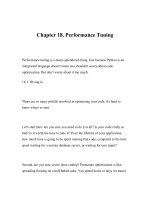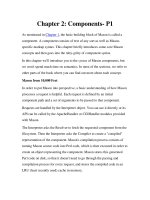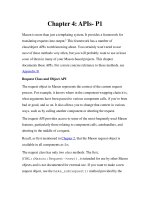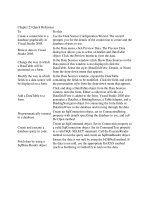Chapter 18 Exception Handling pptx
Bạn đang xem bản rút gọn của tài liệu. Xem và tải ngay bản đầy đủ của tài liệu tại đây (315.62 KB, 36 trang )
Chapter 18
Exception
Handling
Copyright © 2006 Pearson Addison-
Wesley. All rights reserved. 18-2
Learning Objectives
♦
Exception Handling Basics
♦
Defining exception classes
♦
Multiple throws and catches
♦
Exception specifications
♦
Programming Techniques for
Exception Handling
♦
When to throw exceptions
♦
Exception class hierarchies
Copyright © 2006 Pearson Addison-
Wesley. All rights reserved. 18-3
Introduction
♦
Typical approach to development:
♦
Write programs assuming things go as planned
♦
Get "core" working
♦
Then take care of "exceptional" cases
♦
C++ exception-handling facilities
♦
Handle "exceptional" situations
♦
Mechanism "signals" unusual happening
♦
Another place in code "deals" with exception
Copyright © 2006 Pearson Addison-
Wesley. All rights reserved. 18-4
Exception-Handling Basics
♦
Meant to be used "sparingly"
♦
In "involved" situations
♦
Difficult to teach such large examples
♦
Approach:
♦
Simple "toy" examples, that would not
normally use exception-handling
♦
Keep in mind "big picture"
Copyright © 2006 Pearson Addison-
Wesley. All rights reserved. 18-5
Toy Example
♦
Imagine: people rarely run out of milk:
cout << "Enter number of donuts:";
cin >> donuts;
cout << "Enter number of glasses of milk:";
cin >> milk
dpg = donuts/static_cast<double>(milk);
cout << donuts << "donuts.\n";
<< milk << "glasses of milk.\n";
<< "You have " << dpg
<< "donuts for each glass of milk.\n";
♦
Basic code assumes never run out of milk
Copyright © 2006 Pearson Addison-
Wesley. All rights reserved. 18-6
Toy Example if-else
♦
Notice: If no milkdivide by zero error!
♦
Program should accommodate unlikely
situation of running out of milk
♦
Can use simple if-else structure:
if (milk <= 0)
cout << "Go buy some milk!\n";
else
{…}
♦
Notice: no exception-handling here
Copyright © 2006 Pearson Addison-
Wesley. All rights reserved. 18-7
Toy Example with Exception Handling:
Display 18.2 Same Thing Using
Exception Handling
Copyright © 2006 Pearson Addison-
Wesley. All rights reserved. 18-8
Toy Example Discussion
♦
Code between keywords try and catch
♦
Same code from ordinary version, except
if statement simpler:
if (milk <= 0)
throw donuts;
♦
Much cleaner code
♦
If "no milk" do something exceptional
♦
The "something exceptional" is provided
after keyword catch
Copyright © 2006 Pearson Addison-
Wesley. All rights reserved. 18-9
Toy Example try-catch
♦
Try block
♦
Handles "normal" situation
♦
Catch block
♦
Handles "exceptional" situations
♦
Provides separation of normal
from exceptional
♦
Not big deal for this simple example, but
important concept
Copyright © 2006 Pearson Addison-
Wesley. All rights reserved. 18-10
try block
♦
Basic method of exception-handling is
try-throw-catch
♦
Try block:
try
{
Some_Code;
}
♦
Contains code for basic algorithm when all
goes smoothly
Copyright © 2006 Pearson Addison-
Wesley. All rights reserved. 18-11
throw
♦
Inside try-block, when something
unusual happens:
try
{
Code_To_Try
if (exceptional_happened)
throw donuts;
More_Code
}
♦
Keyword throw followed by exception type
♦
Called "throwing an exception"
Copyright © 2006 Pearson Addison-
Wesley. All rights reserved. 18-12
catch-block
♦
When something thrown goes somewhere
♦
In C++, flow of control goes from try-block to
catch-block
♦
try-block is "exited" and control passes to catch-block
♦
Executing catch block called "catching the
exception"
♦
Exceptions must be "handled" in some
catch block
Copyright © 2006 Pearson Addison-
Wesley. All rights reserved. 18-13
catch-block More
♦
Recall:
catch(int e)
{
cout << e << " donuts, and no milk!\n";
<< " Go buy some milk.\n";
}
♦
Looks like function definition with
int parameter!
♦
Not a function, but works similarly
♦
Throw like "function call"
Copyright © 2006 Pearson Addison-
Wesley. All rights reserved. 18-14
catch-block Parameter
♦
Recall: catch(int e)
♦
"e" called catch-block parameter
♦
Each catch block can have at most ONE
catch-block parameter
♦
Does two things:
1. type name specifies what kind of thrown
value the catch-block can catch
2. Provides name for thrown value caught;
can "do things" with value
Copyright © 2006 Pearson Addison-
Wesley. All rights reserved. 18-15
Defining Exception Classes
♦
throw statement can throw value of
any type
♦
Exception class
♦
Contains objects with information to
be thrown
♦
Can have different types identifying each
possible exceptional situation
♦
Still just a class
♦
An "exception class" due to how it’s used
Copyright © 2006 Pearson Addison-
Wesley. All rights reserved. 18-16
Exception Class for Toy Example
♦
Consider:
class NoMilk
{
public:
NoMilk() { }
NoMilk(int howMany) : count(howMany) { }
int getcount() const { return count; }
private:
int count;
};
♦
throw NoMilk(donuts);
♦
Invokes constructor of NoMilk class
Copyright © 2006 Pearson Addison-
Wesley. All rights reserved. 18-17
Multiple Throws and Catches
♦
try-block typically throws any number of
exception values, of differing types
♦
Of course only one exception thrown
♦
Since throw statement ends try-block
♦
But different types can be thrown
♦
Each catch block only catches "one type"
♦
Typical to place many catch-blocks after each
try-block
♦
To catch "all-possible" exceptions to be thrown
Copyright © 2006 Pearson Addison-
Wesley. All rights reserved. 18-18
Catching
♦
Order of catch blocks important
♦
Catch-blocks tried "in order" after try-block
♦
First match handles it!
♦
Consider:
catch (…) { }
♦
Called "catch-all", "default" exception handler
♦
Catches any exception
♦
Ensure catch-all placed AFTER more specific
exceptions!
♦
Or others will never be caught!
Copyright © 2006 Pearson Addison-
Wesley. All rights reserved. 18-19
Trivial Exception Classes
♦
Consider:
class DivideByZero
{ }
♦
No member variables
♦
No member functions (except default
constructor)
♦
Nothing but it’s name, which is enough
♦
Might be "nothing to do" with exception value
♦
Used simply to "get to" catch block
♦
Can omit catch block parameter
Copyright © 2006 Pearson Addison-
Wesley. All rights reserved. 18-20
Throwing Exception in Function
♦
Function might throw exception
♦
Callers might have different "reactions"
♦
Some might desire to "end program"
♦
Some might continue, or do something else
♦
Makes sense to "catch" exception in
calling function’s try-catch-block
♦
Place call inside try-block
♦
Handle in catch-block after try-block
Copyright © 2006 Pearson Addison-
Wesley. All rights reserved. 18-21
Throwing Exception
in Function Example
♦
Consider:
try
{
quotient = safeDivide(num, den);
}
catch (DivideByZero)
{ … }
♦
safeDivide() function throws DividebyZero
exception
♦
Handled back in caller’s catch-block
Copyright © 2006 Pearson Addison-
Wesley. All rights reserved. 18-22
Exception Specification
♦
Functions that don’t catch exceptions
♦
Should "warn" users that it could throw
♦
But it won’t catch!
♦
Should list such exceptions:
double safeDivide(int top, int bottom)
throw (DividebyZero);
♦
Called "exception specification" or "throw list"
♦
Should be in declaration and definition
♦
All types listed handled "normally"
♦
If no throw list all types considered there
Copyright © 2006 Pearson Addison-
Wesley. All rights reserved. 18-23
Throw List
♦
If exception thrown in function NOT in
throw list:
♦
No errors (compile or run-time)
♦
Function unexpected() automatically called
♦
Default behavior is to terminate
♦
Can modify behavior
♦
Same result if no catch-block found
Copyright © 2006 Pearson Addison-
Wesley. All rights reserved. 18-24
Throw List Summary
♦
void someFunction()
throw(DividebyZero, OtherException);
//Exception types DividebyZero or OtherException
//treated normally. All others invoke unexpected()
♦
void someFunction() throw ();
//Empty exception list, all exceptions invoke
unexpected()
♦
void someFunction();
//All exceptions of all types treated normally
Copyright © 2006 Pearson Addison-
Wesley. All rights reserved. 18-25
Derived Classes
♦
Remember: derived class objects also
objects of base class
♦
Consider:
D is derived class of B
♦
If B is in exception specification
♦
Class D thrown objects will also be treated
normally, since it’s also object of class B
♦
Note: does not do automatic type cast:
♦
double will not account for throwing an int









